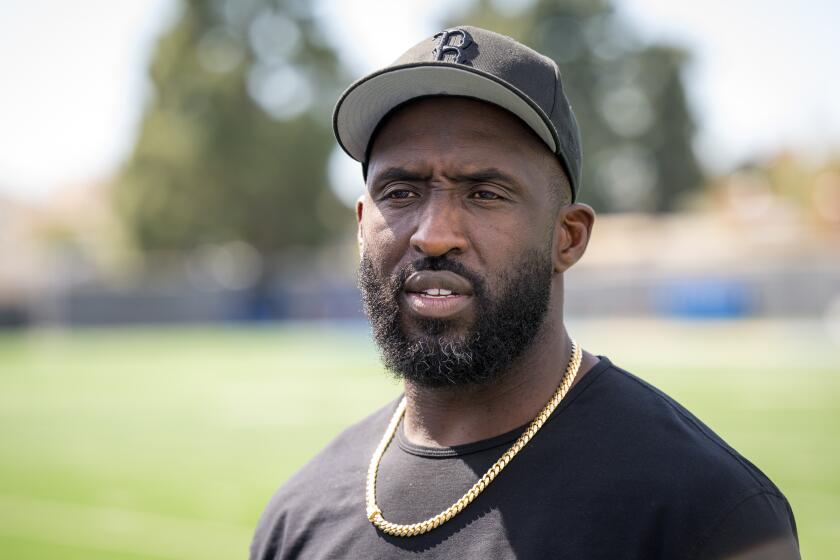Former UCLA athletes try to make a difference
- Share via
This is about where we left off with Brendon Ayanbadejo: playing the biggest game of his career in Miami, his mind on those who haven’t received the same great opportunities.
In December 1998, Ayanbadejo was a senior linebacker at UCLA and the undefeated Bruins had one game against the University of Miami standing between them and a trip to the Fiesta Bowl “national championship” game. Ayanbadejo and some teammates wanted to use the high-profile game to call attention to the diminished number of under-represented minorities at UCLA after the implementation of the anti-affirmative action Proposition 209.
Now he’s on the Chicago Bears, preparing for the Super Bowl at Dolphin Stadium on Sunday. After that he’ll hop on a jet to Hawaii for the Pro Bowl as a special teams player. And yet he’s taking time to bring attention back to UCLA’s African American enrollment crisis that has only worsened in the time since he left campus, to the point black students made up only 2% of this year’s freshman class.
Ayanbadejo and former UCLA basketball star Baron Davis have formed We Should Not Be the Only Ones (weshouldnotbetheonlyones.org) a group whose name refers to the increasing indication that the only black students UCLA appears to want are those with exceptional vertical leaps or 40-yard dash times.
The numbers demand words. Loud words, angry words. For the fall 2006 freshman class, less than 100 African Americans enrolled, the fewest in more than 30 years. Twenty of them were on athletic scholarship, which means we’re getting dangerously close to making a fact from the stereotypical assumption that a black student on campus is an athlete. A ranking of African American student admissions in the fall of 2005 put UCLA 29th among the top 30 colleges and universities.
For those athletes who want to make a difference, it means stepping into the hostile venues of bureaucracy and politics.
“It’s a daunting task, but you’ve got to start somewhere,” Ayanbadejo said. “We’re at the point where we’re saying, ‘This is enough.’
“We’re here to bring light to the situation, see if we can make change through dialogue and bring people on board.”
UCLA interim Chancellor Norman Abrams’ efforts to increase African American enrollment so far have included meeting with the Black Alumni Assn. and attending community forums. He says the new admissions process will incorporate students’ circumstances in addition to their grades and scores. The university reported that the number of African Americans applying to UCLA increased this year.
“We have a campus that I think is a welcoming environment,” Abrams said. “We’ve gotten some bad press as a result of the numbers last spring. We’ve responded to that.
“The efforts of Baron and Brandon, we welcome.
“It’s a complicated answer. The size of the eligibility pool is not as large as we would like.”
Some African American students are saddled with overcrowded and inadequate schools, without access to prep courses to improve standardized test scores or Advanced Placement classes to boost grade point averages.
“It shouldn’t really be debatable,” said Michael Skolnik, a friend of Ayanbadejo’s from UCLA who is helping with the project.
Affirmative action is seen as a greater threat to our society than UCLA’s potential failure to meet its obligation of providing top-quality education to a student body that reflects our region. Any talk of increasing numbers automatically triggers fear of quotas.
This isn’t about reaching a magic figure. This is about creating an environment that supports the widest possible range of students, and attracting the deepest pool of talent from UCLA. Proposition 209 has turned into a tornado, generating its own momentum and causing an increasing amount of damage. As the number of black students dwindles and it becomes more inhospitable to black students, UCLA has found itself losing top African American candidates to Stanford, Berkeley or Ivy League universities.
And so you get scenarios such as the one UCLA Afrikan Student Union President Doug Johnson describes, of being the only black student in a classroom of 70, forced to speak on behalf of all African Americans.
“There’s no way [I] can cover the diverse thought and complexity of a people,” Johnson said. “There’s no way I can do it justice.”
Now, at least, some athletes who went to UCLA before Johnson want to help the students who come after him from being in the same position.
“That means a lot to me,” Johnson said. “They’re at a level where they don’t ever have to look back. But they are. Because it matters to them. Which is out of the norm from the present athlete.”
Funny, but the final resolution will come with a familiar sports theme. Right now we have demands to bring in more African American students from the likes of Ayanbadejo and Davis, promises to bring in more African American students by Abrams. The only thing that matters will be the scoreboard results.
J.A. Adande can be reached at j.a.adande@latimes.com. To read more by Adande go to latimes.com/adandeblog.
More to Read
Go beyond the scoreboard
Get the latest on L.A.'s teams in the daily Sports Report newsletter.
You may occasionally receive promotional content from the Los Angeles Times.






